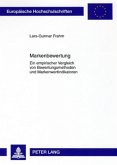Launching brand extensions is seriously considered bycompanies as a profitable growth strategy. The basisof this study is the impact of brand portfoliostrategy and differentiation on consumer evaluationof incongruent extensions, or extensions perceived tohave low fit with the parent brand. The main issueaddressed in this thesis is: how choice of extensionbrand portfolio strategy and differentiation strategyfrom its parent brand can compensate for the problemscaused by lower perceived parent-extension fit?The study was designed as a 2x2x2 experiment to testthe interaction between three independent variables(perceived fit, brand portfolio strategy anddifferentiation) and their impact on one dependentvariable (brand extension attitude). The resultssupport the initial proposition that wisely usingbrand portfolio strategy and differentiation strategymight compensate for lack of fit. Therefore, brandmanagers may overcome problems caused by lowerperceived fit, and succeed with business expansionopportunities that might be found in lower fitcategories.







